In our last post we examined the KJV translation of Paul’s command in I Thess. 5:22 as, “abstain from all appearance of evil.” We explained the idea found in some circles that in the realm of ethics, even if an activity isn’t inherently wrong, if it might appear wrong to others, it must be avoided. This idea has had disastrous consequences when this verse has been abused. We pointed out that Shogren explained that the KJV rendering here, “has been the basis for what is virtually a special branch of ethics, that a believer should refrain from any practice which might appear to be evil, typically to another Christian, although in theory, to any person whatever. This has led to the principle that one’s behavior should be guided by the perception of others…” (ZECNT, pg. 227). We then showed that this idea is in fact what the KJV translators meant to convey in their translation of the verse, not a misunderstanding of the KJV. We traced out two different broad categories of interpretation in history; what we have called the “ethical” and the “prophetic” interpretations. The KJV translation represents one small strand of the ethical interpretation.
But now we raise the much more important question – What did Paul actually mean?
What Was Paul Saying?
To understand Paul’s meaning, we will first zoom in on the word translated “appearance” in the KJV, discuss the arguments for the ethical interpretation, and then examine the context of the verse.
The Word “Appearance/Form/Kind”
We start with a close look at the word εἴδους (eidous), translated in the KJV “appearance.” BDAG, the standard NT Greek lexicon, provides three possible meanings for the word;
① the shape and structure of something as it appears to someone, form, outward appearance
② a variety of something, kind
③ the act of looking/seeing, seeing, sight
The first question is whether Paul has the first or second meaning in view (see also LSJ for other uses of this classical meaning). And even if he has the first meaning in view, one must still make a case that he intends the outward appearance to be something not corresponding to reality if one wants to arrive at the KJV. The KJV took him as referring to something that only outwardly appears evil, but is not inherently so. Note that this is only one shade of the first meaning. But it is far more likely, given the context, that he is talking about something that actually is evil, not something which only appears to be so. He is thus talking about forms or kinds of evil, not a mere “appearance” of evil. Moises Silva explains in the NIDNTTE;
The exhortation in 1 Thess 5:22… has traditionally been rendered, “Abstain from all appearance of evil” (KJV), but it is almost certain that here the term has its common class[ical] meaning, “kind, type, form”…
– Moisés Silva, ed., New International Dictionary of New Testament Theology and Exegesis, pg. 97.
Dan Wallace, we saw last time, wrote an extremely helpful blog post on the passage (all quotes of Wallace here are from that post). Following a suggestion in Kittel, (and with some support from a few Apostolic Fathers) he argues that perhaps a more rare meaning of the word, “to mint a coin” is at play;
Significantly, the noun…(used in this verse) is sometimes translated “mint.” Along these lines, what is interesting to note is that in the early church, the wording of 1 Thess 5:21 was more often attributed to Jesus than to Paul. And it was prefaced by the words “become approved money-changers.” This then was followed by the participial construction, “by abstaining from evil things and by holding fast to the good.” Thus, Paul may well be quoting from a previously unrecorded saying of Jesus in 1 Thess 5:21-22. If so, then these verses need to be rendered as follows: “Test all things; hold fast to the good, but abstain from every false coinage.” The idea then is that believers ought to stay away from that which is counterfeit–that is, false doctrines.
Ethical Interpretations Without The “Mere Appearance” Twist
Whether that intriguing proposal by Wallace is accepted or not, there is still no real reason to assume that Paul means to refer to behavior which appears evil but is not. The ethical interpretation can certainly be held without such a notion, and often has been. For example, Charles Spurgeon held to the ethical interpretation, but suggested that the KJV was wrong to translate the passage as referring to behavior which only appears evil. While doing a verse by verse exposition of the whole chapter, he wrote of this verse;
By which is not meant as some read it, “from everything that somebody likes to say looks like evil.” This would be to mar the Christian liberty. But wherever evil puts in an appearance, when it appears to be good, when it has been dressed out—for the word may refer to a Roman spectacle, or grand procession. Avoid evil even when dressed out in its best, when it comes on in all its gallant show to attract you. Avoid every species and kind of evil—that might almost be the translation—abstain from it altogether.
– C. H. Spurgeon, “Joy in Salvation,” in The Metropolitan Tabernacle Pulpit Sermons, vol. 62, pg. 132.
What About The Lack Of Connectives?
In my opinion, the arguments for the ethical interpretation are weak and unconvincing. The one thing that might be said for an ethical interpretation is to note how sparse verbal connectives are in this list of commands by Paul, as though he meant them to be treated in isolation. Even so, we do have a clear one connecting verse 20 to 21, in the Byzantine and Standard modern texts at least. (It is absent from the Greek text of the KJV NT and all the TR editions I checked, perhaps one more factor which might have affected their misreading of the text.)
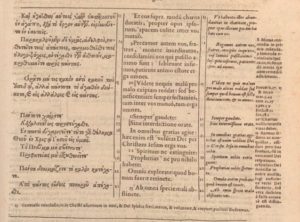
Beza 1598, I Thess. 5:14-23.
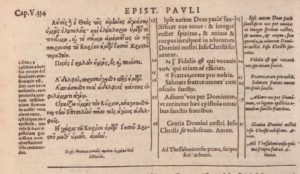
Beza, 1598, I Thess. 5:23-28.
As we saw last time, the KJV interprets and translates the verse as though it stood isolated from its surrounding context, I think quite mistakenly. But they cannot be alone blamed for this. When the Stephanus text first versified the NT, its editor had rendered exceptionally small verses in this entire section, treating the staccato commands here as unconnected to one another. Beza had followed suit in his texts, and so when verse divisions came into English Bibles, this exegetical decision had already been somewhat made for the reader. Gone now were Tyndale’s well-thought out paragraphs.
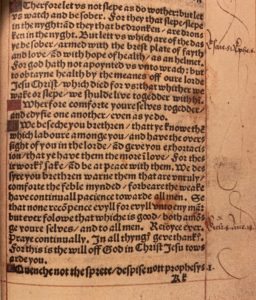
Tyndale 1526, I Thess. 5:6-20a.

Tyndale 1526, I Thess. 5:20b-28.
The Bishops Bible which the KJV revised had done the same thing, followed the same small verse divisions here, and printing each as a separate paragraph. The KJV Translators all had copies of this text in front of them as they did their revising work. The King had ordered 40 unbound copies of this text to be purchased from Richard Barker for them to work on. We still in fact have the receipt for the purchase today.
So, in a way, the visual layout of their text was already subconsciously affecting the way they read the text. It would have been quite an unexpected turn for them to have seen these commands as connected in any way, given their textual resources, and the patterns their eyes were already leading them to see.
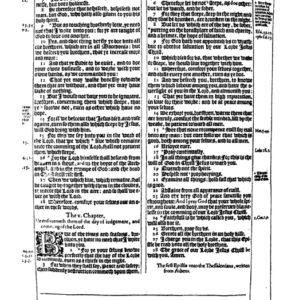
1602 Bishops’ Bible, I Thess. 4:7-5:28.
But does the lack of connectives actually mean that Paul was intending to give a series of disconnected commands? Wallace explains in a footnote that this doesn’t in fact mean that Paul meant them to be read in isolation. Asyndeton (i.e., lack of connection), can serve a variety of functions in the NT. Sometimes such constructions are used to heighten the emphasis of the implicit connection. He notes the example of Phil 4:5, where Paul says, “Let your forbearance be known to all men. The Lord is near.” These two sentences are clearly connected. Also, Wallace notes, in Eph 4:4-5,
after Paul had just instructed the Ephesians about maintaining the unity of the Spirit, he says, “[There is] one body and one Spirit,… one Lord, one faith, one baptism.” Is there no connection between vv 1-3 and vv 4-6? On the contrary, vv 4-6 offer the theological basis and pattern for what Christian unity should be like. In 2 Tim 3:16, Paul reminds Timothy that “Every Scripture is inspired and profitable.” Such a solemn statement surely has a connection with v 15: “You have been acquainted with the sacred writings from your childhood.” Thus, asyndeton does not necessarily or even normally imply no connection. Often, it is used to heighten the connection with what was previously mentioned. We believe that that is the case in 1 Thess 5:19-22 as well.
In any case, even if one found the ethical interpretation convincing, there is no clear reason to take the “even the mere appearance” of evil form of this interpretation found in the KJV. Still less would there be grounds for the common use of this verse to build and bulwark hosts of unbiblical commands. God simply didn’t intend for you to lead your life held captive to the conscience of others, and still less to live your life more concerned about what they thought of you than what he did.
Keeping The Verse In Its Historical And Literary Contexts
The basic differences between ethical and prophetic interpretations of the passage are the result of whether or not the surrounding context shapes our reading of the verse. The peculiar “mere appearance” form of the ethical interpretation has virtually nothing to commend it, though broader ethical interpretations may have more weight. What ultimately convinces me (and virtually all modern interpreters) of the prophetic interpretation are the historical and literary contexts. Whatever one might think about the continuation/cessation of prophecy today, no one can deny its presence at Thessalonica in the NT era in which Paul wrote. As Chrysostom well said, “There were among them many indeed who prophesied truly, but some prophesied falsely,” and this reality created a need for a balanced response by Paul, which would neither denigrate prophecies nor accept them all gullibly.
This historical reality is precisely the issue Paul raises in the immediate literary context when he commands not quenching the Spirit/despising prophecies in verse 19-20, and specifically urges the testing of prophecy in verse 21. The connective δὲ (de), “but,” explicitly connects his command about “testing all” to the “prophecies” of verse 20.
Since the positive command to test all things stands in an antithetical relationship to the two preceding negative commands, the adjective panta (all things), as Ellicott…notes, “must thus have a restricted sense, and be limited to the spiritual gifts previously alluded to” …The contemporary application of this command may justly be extended to other aspects of the Christian life, but its original intent is restricted to the testing of all prophecies.
– Jeffrey Weima, BECNT, pg. 408–409.
That is, it is grammatically undeniable that vs. 20-21a raise the historical issue of prophecy and the need for a balanced approach that nether denigrates nor uncritically accepts prophecy.
Vs. 21b-22 clearly come together as paired commands. “Good” is the antonym of “evil” (and Paul’s regular use of this construction makes clear that he intends “evil” as a noun here – see Fee, NICNT). And while it is lost in English, the verbs “hold fast” and “let go of/abstain from” are in fact the same root with only a different prefix. Weima notes, “The two verbs used here, both having the same root and differing only in a prefix, are strong and express wholehearted acceptance of prophecy that is judged good and absolute rejection of prophecy deemed evil” (BECNT, pg. 410). This pair of commands very clearly explains the two-fold response to the “testing” of verse 21a. But as we just saw, that “testing” is grammatically tied to the “prophecies” of verse 20. This all but forces us to conclude that these paired commands explain how we should respond to the tested prophetic utterance. Weima explains;
These two final exhortations can and have been taken out of their specific context and turned into universal maxims that are applicable to any and all situations, even by those who recognize that the preceding verses deal specifically with Spirit-inspired utterances… But since this couplet is intended to specify the previous command to test all things (v. 21a), and this previous command is in turn intended to contrast with the preceding prohibitions about the Spirit and prophecies, there can be no doubt that in these closing verses Paul continues to be focused narrowly on the testing of these spiritual utterances.
(BECNT, pg. 410).
We could set this out visually like this;
- Despise not prophecy
- But test all things;
- Hold fast that which tests good
- Reject that which tests evil
The two minor questions that remain are,
- Why does Paul’s wording, somewhat awkwardly, not exactly mirror itself in the final couplet of vs. 21-22?
- Why does Paul use the longer phrase “every kind of evil” in the final command in vs. 22 and the simple singular “the good” in the command in verse 20?
The answer to the first question is likely that Paul has intentionally echoed the language of the Septuagint (the Greek translation of the OT that he is using) of Job 1:8, where Job is described as an upright man, who “is a man blameless, true, godly, abstaining from every evil deed.” Fee explains that the Greek is strikingly close;

In answer to the second question, Fee notes, “The best explanation here would seem to be an older one, that in Paul’s view ‘good’ is singular, whereas ‘evil’ takes many forms. In any case, the context, and the verbal plays between the two final clauses, seems to demand that this final clause also refers to prophetic utterances” (NICNT, pg. 224).
Even if one doesn’t like those answers or can’t answer every question about the precise wording, what Paul is saying in verse 22, if we read it in its context, is nonetheless abundantly clear. Paul is addressing the reality that prophecy is genuinely from the Spirit and must not be quenched or disdainfully rejected, yet also must not be uncritically accepted. Thus, he urges testing all prophetic utterances. Once tested, the good should be received, and lived out, while the bad should be rejected. Wallace concludes;
1 Thess 5:22 is apparently talking about staying away from false teaching and has nothing to do with lifestyle per se. It should be translated, “Abstain from every form of evil” or “Abstain from every false coinage [i.e., false doctrine].” Further, to wield it as a weapon of legalism is against the general tenor of the New Testament and of the Lord’s life in particular. Ironically, to avoid every appearance of evil is far more in keeping with the Pharisees’ model of righteousness than with Jesus’! The Westminster Shorter Catechism starts off by noting that the chief end of man is to “Glorify God and enjoy him forever.” This capsulizes God’s goal for humanity well. We must not forget that there are two verbs in this brief answer.
Did Jesus Abstain?
One final point must be made against the “mere appearance” interpretation. Wallace notes that in order for this form of the ethical interpretation to hold true, three things must line up;
(1) “form” must lack correspondence to reality (like the word “appearance” seems to do in the KJV translation);
(2) v 22 must be interpreted in isolation from vv 19-21; and
(3) we would expect to see examples, in the life of Paul and others in the NT, of avoiding the appearance of evil.
It is this third point that Wallace finds especially lacking. The first two could be argued, grammatically and linguistically (we have argued against both above), but not the third, which “fails miserably.” That is, if Paul is forbidding even behavior that merely appears evil here, then both Paul, and, more importantly, Jesus, were in regular blatant sin against this verse. Wallace explains;

Paul was noted for becoming all things to all men (1 Cor 9:20-22) for the sake of the gospel. He often did things that certain sin-sniffers viewed as lacking propriety (cf. Gal 2). But he did them both because of his passion for the gospel and because of “our freedom which we have in Christ Jesus” (Gal 2:4).
But Paul is not the supreme example of one who did not avoid the appearance of evil. Jesus is. He spent so much time with tax-collectors and sinners that he was labeled a glutton and a drunkard (Matt 11:19; Luke 7:34). Indeed, his very first miracle was to change water into wine (John 2), enabling the festivities to keep going. The distinct impression one gets from the Gospels is that Jesus simply did not have the same scruples about his associations that the religious leaders of the day had. They avoided the appearance of evil at all costs; Jesus seems almost to have had the opposite approach to life and ministry (cf., e.g., Luke 7:39). Even his disciples had been oppressed by all the rules and traditions of men. But Jesus freed them from such nonsense. In Matt 15, the Pharisees were stunned that Jesus’ disciples did not perform the Jewish hand washing ritual before they ate. They hammered on the disciples and on Jesus for not obeying the oral commandments. Jesus did not say, “Sorry, boys. I didn’t mean to cause offense. It won’t happen again.” Instead, he very boldly pointed out that these religious leaders had exchanged the laws of God for their own self-made rules. He called them hypocrites who had no heart for God. The most remarkable verse in this whole pericope is verse 12: Jesus’ disciples came to their Master and said, “Did you know that the Pharisees were offended by what you just said?” Didn’t they know that offending the Pharisees was part of Jesus’ job description!
…Oral traditions that heap requirements on people because of some outspoken individual’s overbearing conscience are an anathema to the Lord and to the evangelical faith. May ours be, once again, a robust faith and a life of enjoyment of God and of the good gifts he bestows on us.
“The distinct impression one gets from the Gospels is that Jesus simply did not have the same scruples about his associations that the religious leaders of the day had. They avoided the appearance of evil at all costs; Jesus seems almost to have had the opposite approach to life and ministry.”
– Dan Wallace
Conclusion – Internalizing Righteousness
When we take all this together, it becomes abundantly clear that Paul is talking in this passage about the testing of prophecies. Neither this passage (nor any other) gives weight to the “sin sniffer” who tries to legalistically impose unbiblical rules on others. And this passage gives no support to the externalizing of piety which is a plague in the church as old as the Pharisees.
One can’t help but wonder – if Christians were required to abstain from all appearance of evil, how much of Christian ministry would simply not have happened? Much of what Jesus did would have to be cut out of the New Testament. And what of modern workers like Jackie Pullinger, spending her entire life around prostitutes and their Johns, drug addicts and their dealers? Should we conclude that her whole life has been sin? Or should we perhaps be convicted by her breathless service to Christ, and be inspired to greater sacrifices for Christ in our own life? One does not take a prostitute on a date if they are following the KJV here. And a powerful demonstration of God’s love would have been lost had such a rigor been followed. The truth is, the “abstaining” principle is patently about an outward appearance of righteousness. And this is precisely the element of the Pharisees’ teaching that Jesus so often opposed, demanding that God’s concern was internal holiness, and that God’s transformation moves from the inside out, not the outside in (see Matt. 5:17-48).
In our social-media-saturated culture, the enticement of external appearance is a strong one. We shape carefully crafted tweets, impeccable Instagram selfies, and eminently editable Facebook posts. The right clothes, the right haircut, the right words – you have more control than ever before over your external “image”; an edited shell of the real you. This can bring its blessings, but it also brings its dangerous temptations.
The church does not need more Christians concerned to run their own PR campaign to promote their image as “godly.” Neither the example of Jesus nor this passage in Paul could ever be rightly used to support such an approach.
What the church needs today rather is counter-cultural Christians committed to true holiness – the kind that is authentic, internal, and deep – not weaklings seduced by the allure of building a skin-deep superficial image. May we see a revival of holiness so deep that it overflows into external behavior; so abundant that it can’t but transform how we live. May we never reverse that order. May the gospel of a crucified and risen Lord grip us and transform us into authentic holiness. And may we never settle for any cheap and shallow substitute.
The simple reality, difficult for some to swallow, is that the KJV is patently mistaken in how it translated this verse. They weren’t the first; they left this verse of the Bishop’s Bible which they were revising unchanged, and both the Great Bible and Tyndale before had, with different wording, provided the same interpretation. But the enduring effect of their translation has caused long and lasting damage in the church as a prop for legalism, and an externalized piety, sometimes with consequences that are nothing short of disastrous.
An Affront On The Doctrine Of The Sufficiency Of Scripture
At the end of the day, any creation of laundry lists of extra-biblical ethical rules is an affront to the liberty of grace (which Spurgeon noted above). But while it is not often realized, it is also an affront to the sufficiency of Scripture. Those who create such unbiblical rules are patently saying, “The commands the Bible gives us are not sufficient to regulate morality. We have to supplement them with our own rules.” It is here that the “Sin Sniffer’s” use of I Thess. 5:22 in the KJV to bolster such lists becomes most clear for what it is. In his popular Systematic Theology, after explaining the doctrine of the sufficiency of Scripture, Wayne Grudem explains how such rules undermine that doctrine. We end this post with his plea to live out the sufficiency of Scripture by rejecting legalistic proliferation of rules;
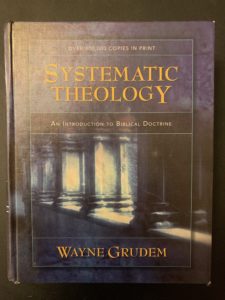
With regard to living the Christian life, the sufficiency of Scripture reminds us that nothing is sin that is not forbidden by Scripture either explicitly or by implication. To walk in the law of the Lord is to be “blameless” (Ps. 119:1). Therefore we are not to add prohibitions to those already stated in Scripture. From time to time there may be situations in which it would be wrong, for example, for an individual Christian to drink coffee or Coca-Cola, or to attend movie theaters, or to eat meat offered to idols (see 1 Cor. 8–10), but unless some specific teaching or some general principle of Scripture can be shown to prohibit these (or any other activities) for all believers for all time, we must insist that these activities are not in themselves sinful and they are not in all situations prohibited by God for his people.
This also is an important principle because there is always the tendency among believers to begin to neglect the regular daily searching of Scripture for guidance and to begin to live by a set of written or unwritten rules (or denominational traditions) concerning what one does or does not do in the Christian life.
Furthermore, whenever we add to the list of sins that are prohibited by Scripture itself, there will be harm to the church and to the lives of individual believers. The Holy Spirit will not empower obedience to rules that do not have God’s approval from Scripture, nor will believers generally find delight in obedience to commands that do not accord with the laws of God written on their hearts. In some cases, Christians may repeatedly and earnestly plead with God for “victory” over supposed sins that are in fact no sins at all, yet no “victory” will be given, for the attitude or action in question is in fact not a sin and is not displeasing to God. Great discouragement in prayer and frustration in the Christian life generally may be the outcome.
In other cases, continued or even increasing disobedience to these new “sins” will result, together with a false sense of guilt and a resulting alienation from God. Often there arises an increasingly uncompromising and legalistic insistence on these new rules on the part of those who do follow them, and genuine fellowship among believers in the church will fade away. Evangelism will often be stifled, for the silent proclamation of the gospel that comes from the lives of believers will at least seem (to outsiders) to include the additional requirement that one must fit this uniform pattern of life in order to become a member of the body of Christ.
– Wayne A. Grudem, Systematic Theology: An Introduction to Biblical Doctrine , pg. 132–133.



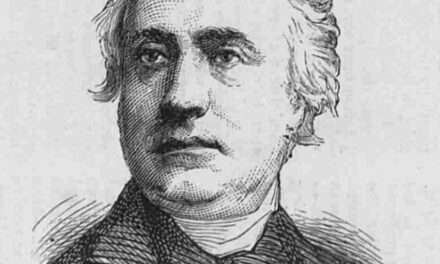

Timothy Berg, like so many other Christians today, is his own authority and has NO Bible in any language he can show us that he honestly believes is now or ever was the complete and inerrant words of God. And he is wrong about the King James Bible and how it translated 1 Thessalonians 5:22. The KJB is right, as always, and here is why – (this is my own article).
1 Thessalonians 5:22 KJB – “Abstain from all APPEARANCE of evil.”
NKJV – “ Abstain from every FORM of evil.”
https://brandplucked.webs.com/1thes522appearance.htm
“He that hath ears to hear, let him hear.” Luke 8:8
God bless.